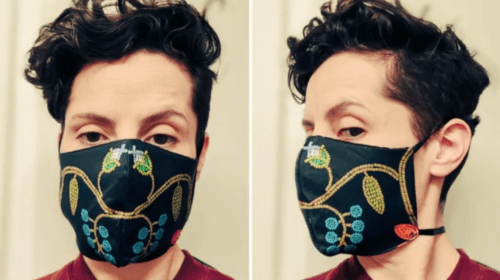If you take a trip to your local Target or Walmart, you’ll find distressingly empty rows next to curiously overstocked ones. In the former, it’s toilet paper or hand sanitizer. And in the latter, it’s cosmetics or decorative pillows. I don’t need to remind you about the arbitrariness or silliness of the Toilet Paper Wars of March 2020. Their impact remains. Nor should I need to remind you how people hoard corporate, mass produced goods when they think their family is in danger. But I do hope to show that cloth masks are an important exception.
People behave strangely during times of crisis. Maybe the last few weeks left you scratching your head. Why did people hoard toilet paper before genuinely essential goods like food? Why buy a year’s supply of toilet paper when no clear-thinking person believes you need it?
What’s going on here?
Toilet Paper and Sense of Control
Here’s a big part of the toilet paper story: People got scared and panicky. Coronavirus and COVID-19 were dangerous things largely out of their control – sweeping the land according to growth patterns laid out by health experts and beyond ordinary comprehension. Sure, they could do things like lobby their governor for stay-at-home orders. But there just weren’t many tangible steps they could take to make a meaningful difference in their own lives.
Psychologically, this is a bad situation. No one likes big, scary things they can’t control. And experts didn’t – at first – offer satisfying solutions. Remember the mid-March calls for social distancing? This was decent science, but bad psychology. The term was unfamiliar to most people, and doubling our personal space didn’t feel sufficient to stop a pandemic. You probably felt like you needed to do more.
Going to Target or Walmart and buying them out of their toilet paper stock? That’s more like it! That’s concrete action. You can get in your car, go somewhere, and return home with proof you’ve made your family’s lives better.
Negative Impact
Did it really make your family’s lives better? Of course not. No expert or right-thinking person thinks you need a year’s supply of toilet paper. Perhaps there are some very narrow exceptions.
Unfortunately, toilet paper hoarding was no venial sin. It had real, negative social impact. For one, lots of non-hoarders now find themselves out of toilet paper and without a reliable means to get any. Not the end of the world, but very annoying and inconvenient.
But a second and more important one is that the hoarding itself contributed to the spread of COVID-19. The height of the hoarding problem lasted from about March 11 to March 18. And if you look at the data on new cases, you’ll find the worst exponential growth stage lasted from about March 16 to March 26. Coronavirus’s incubation period is about 4-7 days, with a median of 5 days. And so, given roughly a week’s lag between exposure and positive test, people infected during the exponential growth stage were infected between March 9 and March 19.
What was happening at exactly that time? People packed tightly into stores to hoard toilet paper!
Cloth Masks
And then there are cloth masks. You have websites advising you on how to make your own masks, as well as local crafters making them for donation or sale at a reasonable price. It’s a wholesome story. Eventually, the CDC advised Americans to wear one during their essential errands.
Positive Impact?
Do cloth masks work? It depends on what you want them to do. There’s evidence cloth masks protect from allergens, pollen, dust, et al. And perhaps they provide very limited protection from bacteria. Maybe even – but probably not – from coronavirus. If they’re effective at anything COVID-19 related, it’s probably in preventing asymptomatic coronavirus carriers from spreading it.
So, why did the CDC recommend cloth masks? And why do I ultimately think it’s a good recommendation? This goes back to what you want the cloth masks to do. As with hoarding toilet paper, making and/or wearing cloth masks is something scared and panicked people do to gain a better sense of control over their lives. It’s concrete action most people can take.
And unlike hoarding toilet paper, it doesn’t harm anything. It provides psychological benefits and brings people closer. If you want to do it, go for it! You have my full blessing. I’d also recommend reading.
Just don’t snark at people who don’t wear one.
